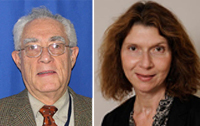Conflict-of-Interest Policy
Albert Einstein College Of Medicine Earns Top Mark For Conflict-Of-Interest Policy
(March 12, 2012) – BRONX, NY – Albert Einstein College of Medicine of Yeshiva University has earned an "A," the top mark, for its conflict-of-interest policies from the American Medical Student Association (AMSA), the oldest and largest independent association of physicians-in-training in the United States.

Michael Reichgott, M.D., Ph.D. (left), Elizabeth Kitsis, M.D. (right)AMSA, which issued its 2011-2012 AMSA PharmFree Scorecard last Friday, uses letter grades to report on U.S. medical schools' performance in 11 potential areas of conflict. Of the 152 U.S. medical schools, only 28 (18 percent) received A's.
The medical schools were rated in 11 potential areas of conflict including policies on gifts and meals, industry-funded speaking relationships, visits by industry sales representatives and pharmaceutical samples, among others.
AMSA ranked Einstein as having a "model policy," the highest ranking, in 8 of the 11 categories and determined that the College is making "good progress toward a model policy" in the remaining 3 categories. (See full report.)
Michael Reichgott, M.D., Ph.D., professor of medicine and chair of the conflict of interest committee at Einstein, led the school's recent effort to review and update its policies. Significant support was provided by members of the committee, with strong cooperation from Montefiore Medical Center, the University Hospital for Einstein. Committee member Elizabeth Kitsis, M.D., assistant professor of epidemiology & population health and director of bioethics education at Einstein, has recently revised and expanded the conflict of interest component of the bioethics curriculum in order for Einstein's medical students to learn about this important topic early in their education. Dr. Kitsis is also a faculty member for the Einstein-Cardozo Master of Science in Bioethics program.
AMSA, which is a student-governed, nonprofit organization, began its PharmFree Campaign in 2001 and has issued the Scorecard for the past five years. Ninety-eight percent of all eligible medical institutions participated in this year's Scorecard.
Other Top Stories
9/11 World Trade Center Exposure Linked to Heart Disease Among NYC Firefighters
On Becoming a Physician: New Einstein Students Receive White Coats and Stethoscopes
Novel Therapy for Acute Migraine Shows Promise in Phase 3 Clinical Trial
First Complete Wiring Diagram of an Animal's Nervous System
Multimillion Dollar NIH Grant to Help Reduce Opioid Use & Get Care to People Who Need It
NIH Grant Funds $23 Million Study of Diseases Affecting People Living with HIV
New TAILORx Data Guides Adjuvant Therapy in Younger Breast Cancer Patients
Einstein Celebrates Its 61st Commencement
Bolstering Biopsies: Testing Patients' Individual Cells to Guide Treatment



Tablet Blog